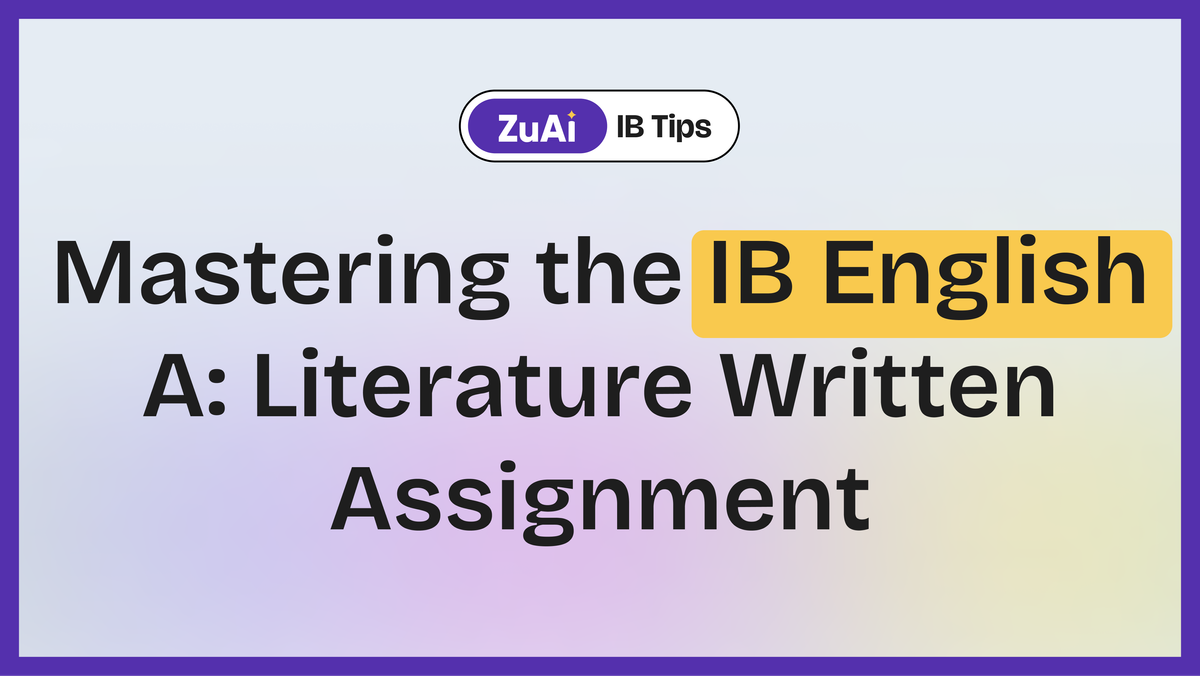Mastering the IB English A: Literature Written Assignment – Tips and Strategies for N24/M25

Author: Olivia Clark, IB English Examiner and Expert Teacher
Introduction
The IB English A: Literature Written Assignment is your chance to showcase deep analytical skills, creative writing ability, and mastery of literary works. As an experienced IB English examiner, I’ve seen students excel by understanding the task and applying the right strategies. Whether you're in N24 or M25, this guide will help you craft an outstanding written assignment that stands out.
Step 1: Choose a Text That Inspires You
Your Written Assignment is based on a literary work from Part 1 of the course, so it’s crucial to choose a text that resonates with you. Whether it’s a novel, play, or collection of poems, make sure it’s something you enjoy analyzing.
Pro Tip: The more passionate you are about the text, the easier it will be to write your assignment. Review examples of successful IB English Written Assignments to see how students have approached different texts.
Step 2: Develop a Focused Research Question
A clear, focused research question is the backbone of your Written Assignment. This question should guide your analysis and help you stay on track throughout the writing process.
Example: If you’re analyzing The Great Gatsby, your research question might be, “How does F. Scott Fitzgerald portray the American Dream through the use of symbolism in The Great Gatsby?”
Your research question needs to be specific enough to allow for detailed analysis, yet broad enough to explore different aspects of the text.
Step 3: Plan Your Analysis
Before you begin writing, spend time planning your analysis. Organize your notes, quotations, and ideas into a clear outline. Break down your argument into sections, each focusing on a specific element of your text, such as theme, character development, or literary devices.
Pro Tip: Create a thesis statement that encapsulates your overall argument. Every section of your assignment should support this thesis.
Step 4: Write with Precision and Clarity
Once your outline is ready, start writing your first draft. Focus on clarity and precision, ensuring each paragraph links back to your research question and thesis statement.
Example: When analyzing symbolism in The Great Gatsby, provide clear examples from the text (such as the green light) and explain how they relate to your research question about the American Dream.
Pro Tip: Avoid overloading your essay with too many quotes. Instead, use quotations strategically to support your points and provide analysis on their significance.
Step 5: Revise and Edit
After completing your draft, take the time to revise and polish it. Check for any inconsistencies in your argument, refine your phrasing, and make sure your analysis flows logically from one point to the next.
Pro Tip: Have a peer or teacher review your assignment for feedback. Sometimes, a fresh perspective can help catch mistakes or suggest improvements.
Step 6: Finalizing Your Written Assignment
Before submitting your assignment, double-check your citations, word count, and formatting. Make sure everything adheres to the IB guidelines. Ensure that your thesis is clear, and your analysis thoroughly addresses your research question.
Pro Tip: Use plagiarism-checking tools to ensure your work is completely original. Academic honesty is crucial in IB assessments, and presenting your own ideas is key to a successful Written Assignment.
Bonus Tip: AI app for IB Exams = ZuAI
It's the ultimate AI app designed to help your child excel in their IB exams. As a parent, you want the best for your child, and so do we.
ZuAI provides personalized study support, practice questions, and detailed explanations tailored specifically to the IB curriculum.
Think of it as a smart tutor who understands your child’s unique learning needs, helping them tackle challenging subjects with confidence.
With ZuAI, you can feel reassured knowing your child is getting the extra help they need to succeed and build a bright future.
We genuinely care about your child's success and are here to support them every step of the way.

Looking for free solutions to previous year's question papers? Check out ZuAI's YouTube channel.
FAQ Section
Q1: How long should my IB English Written Assignment be?
A: The Written Assignment should be between 1,200 and 1,500 words. Be concise but ensure you provide enough depth in your analysis to fully address your research question.
Q2: How do I choose the best text for my Written Assignment?
A: Choose a text that you’re passionate about and that has plenty of scope for analysis. Think about how much you can say about its themes, characters, and literary techniques. Reviewing past successful assignments might help inspire your choice.
Q3: Can I use more than one text in my Written Assignment?
A: No, the IB English A: Literature Written Assignment should focus on one text from Part 1 of the course. However, you can make brief references to other works for comparison or context, as long as they don’t dominate your analysis.
Q4: How important is my research question in the final assessment?
A: The research question is critical as it guides your entire assignment. A well-crafted question allows for a focused, coherent analysis, which is essential for achieving high marks.
Q5: What should I include in my introduction?
A: Your introduction should present your research question, give some context on the text, and provide a brief overview of how you plan to address the question in your analysis.
Conclusion
The IB English A: Literature Written Assignment is your chance to demonstrate your analytical and writing skills in a subject you’re passionate about. By choosing an engaging text, crafting a focused research question, and supporting your arguments with evidence, you can create a Written Assignment that stands out. Follow these tips, and you’ll be on your way to a top score in your N24 or M25 session. Good luck!
